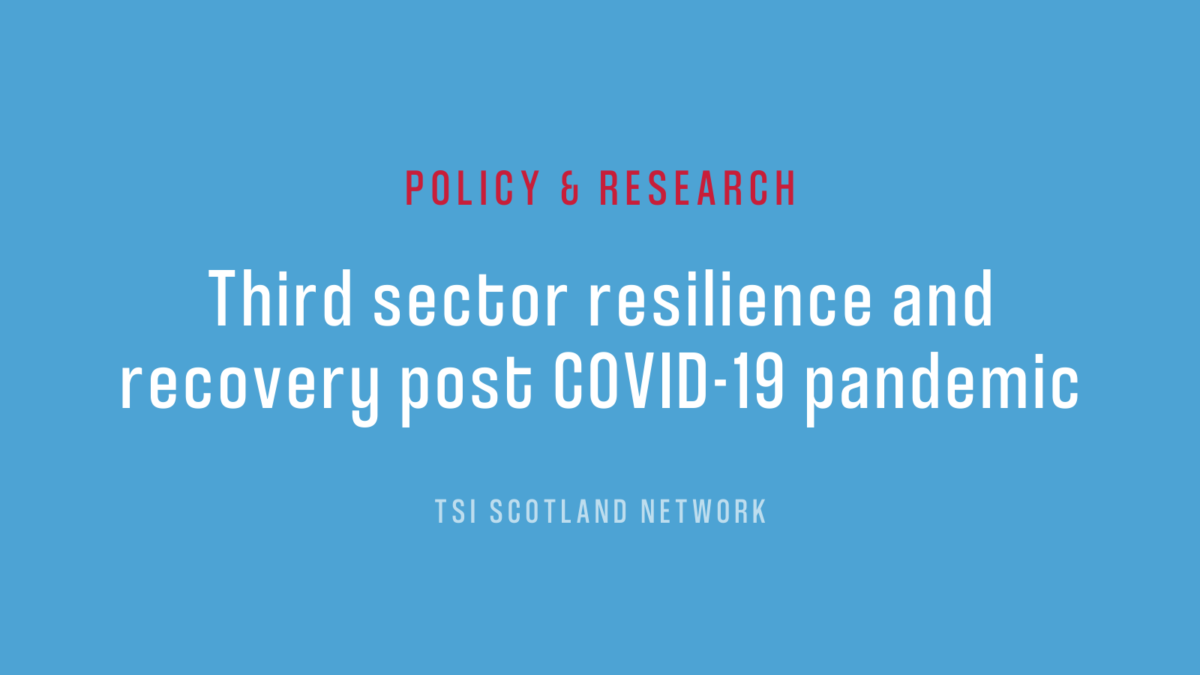TSI Scotland Network is pleased to have been invited to contribute to the Scottish Parliament’s Social Justice and Social Security Committee session on third sector resilience and recovery.
We are delighted to have an opportunity to highlight the crucial role third sector has played during the COVID-19 pandemic and contribute to discussions on how to best support its resilience.
Below is the briefing we have submitted ahead of appearing at committee on 9 December 2021.
Our submission
About TSI Scotland Network
The TSI Scotland Network is a body of charities that support the third sector across Scotland. There are 32 TSIs – or Third Sector Interfaces in Scotland, one for each local authority area.
Each TSIs is embedded within the community it serves and has a deep localised knowledge of the third sector in their area. We have trusted relationships with voluntary organisations and community groups on a local level and across the whole range of policy areas. As a network, we work together to enable and facilitate third sector involvement in creating a fairer, wellbeing society which also tackles the climate emergency.
TSIs have played many significant roles during the pandemic. We have coordinated the third sector’s crisis response – connecting people, organisations and resources with a focus on key areas such as food, isolation, medicine collection, and parenting support. We have supported TSOs in challenging times, helping them to access funding and reboot their business models. And we have had a key role in involving the third sector and partners in resetting the agenda both locally and nationally, in areas such as vaccine roll out, economic recovery, and employability.
Introduction
TSI Scotland network welcomes the opportunity to highlight key challenges facing the sector as a result of the COVID19 pandemic and contribute to discussions on long-term resilience.
Scotland’s third sector stepped up in an unprecedented way during the Coronavirus pandemic. Charities, social enterprises and community groups supported people in their homes and communities, delivering food, medicine, digital devices and activities for the young and elderly to get through both lockdowns.
It is essential that the third sector remains at the heart of recovery planning.
For this to happen a longer view of third sector resilience needs to be considered and issues affecting its financial stability addressed. The pandemic has not only highlighted the sector’s contribution to the Scottish society and people’s wellbeing; it has also given us an opportunity to re-evaluate our practices and re-imagine the structures that affect the sector’s ability to achieve best outcomes for communities.
Below are key emerging priorities that would support third sector’s resilience as identified by TSI Chief Officers across Scotland.
Key priorities
Sustainable and long-term funding
The COVID19 pandemic has negatively impacted all areas of income generation in the third sector, and the biggest drops were more extreme than past recessions. Areas that were most impacted included trading, fundraising and donations.[1] Over a half of third sector organisations saw a decrease in turnover compared with pre-pandemic levels.[2]
Moreover, the crisis has exacerbated the fragile nature of the third sector funding systems. Approximately a third of charities has already been considered vulnerable at the onset of the pandemic as it had less than three months of expenditure in reserves. [3] The Social Renewal Advisory Board (SRAB) highlighted that the sector’s reliance on short-term funding and ongoing lack of secure funding has meant some organisations struggled to survive during the pandemic – when services have been most needed.[4]
The Scottish Government’s initial support of the voluntary sector, a £350 million cash injection, was a welcome recognition of the value of sector’s contribution. Short term emergency funding enabled the sector to deliver in communities at pace in a time of need but it can be prohibitive to addressing ingrained multi-generational inequalities.
Recovery requires a move away from short term funding arrangements to a new way of funding the third sector by building long term relationships, including minimum of 3-year contracts to enable long term sustainability and best outcomes for communities.
Fair work and staff wellbeing
The pandemic has increased demand for third sector organisations, services and activities, with 57% of organisations reporting an increase.[5]
This trend is key in understanding how staff in the sector have been affected. Earlier this year, an in-depth study which explored the immediate and emerging risks faced by organisations in the charity sector, found that 44% saw staff ‘burnout’ and challenges related to the pandemic as a major threat to their ongoing operations. [6]
Historically, the third sector has offered lower levels of stability and pay to staff, in comparison to the statutory sector due to reductions in funding. The COVID-19 pandemic and realities of remote working have made it even more challenging for third sector organisations to compete for talent. The lack of ability to offer competitive employment conditions contributes to high staff turnover and loss of historic knowledge and experience.
Recovery requires government commitment to invest strategically in the third sector locally and nationally in years ahead to enable it sustain, improve and evidence its contribution. This should include a recognition of the need for fair work for third sector employees and honouring inflationary uplifts and pay awards.
Volunteering recovery
As the crisis unfolded volunteers stepped up to the numerous and complex challenges of Covid-19, and they did so at pace. However, while some sections of the population were suddenly free to help out, others were shut out through restrictions and/or shielding. Many inequalities in volunteering participation widened. It is crucial to support people to return to volunteering including older demographics and those who were shielding.
Enormous community effort enabled effective emergency response, especially during the initial outbreak of the pandemic. As we learn to live in a world with COVID19, it cannot be expected for informal community supports to substitute essential statutory provision as this makes volunteers feel fatigued and undervalued.
Similarly, structured, long-term volunteering can only be enabled with the right support. This includes effective recruitment, safeguarding and engagement to provide positive experience for volunteers. Recovery requires investment in volunteer management to ensure people, communities and society as a whole can experience its benefits.
Our shared ambitions for the national Volunteering for All framework and for a fairer, sustainable, wellbeing economy can only be maximised if we address both (a) the volunteering policies, programmes and services required and (b) a range of necessary developments in economic, social security, childcare, education and community empowerment policies too. The approach adopted by Government to the development of the framework action plan – to fully understand the complex system of factors that impact on the national outcomes in order to then arrive at a plan with the “optimal combination of programmes, investments and interventions” – is therefore very positive.
Further factors impacting third sector’s resilience
- Increase in UK minimum wage (6.62% and real living wage of 4.2%) and NI (1.2%) is expected to have direct impact on the charitable sector. There is a need for statutory contracts to reflect these increases as otherwise charities and social enterprises might not have sufficient incomes to carry on.
- Social Enterprises have been severely affected by the pandemic. 81% of social enterprises have experienced a reduction in income from trading.[7] The wage increases and lack of predictability of income streams puts a significant pressure on this segment of the sector.
- Young people volunteering has been negatively impacted as they have not been able to access opportunities during the pandemic. This causes concerns around wider resilience and young people’s active contribution to civic engagement.
- Third sector childcare sector has been severely impacted due to remote working and Brexit, with childcare becoming a less appealing career option. This creates future risks for when more activity resumes, and affordable childcare is needed.
- There is confusion and lack of guidance available for re-opening of some services i.e. lunch clubs which is hindering the process.
- Third sector plays an active role in supporting grassroots action on climate emergency. There is a need to invest in the sector to support community climate action.
The sector’s infrastructure
The pandemic has highlighted the important role intermediary bodies play in supporting and developing the third sector. The Scottish Government has recognised our vital contribution to identifying emerging needs, supporting organisations in challenging times and directing money to people and communities who need it most. We have welcomed being a trusted partner, among other intermediaries, and supporting third sector resilience needs through initiatives such as Wellbeing Fund and most recently Mental Health and Wellbeing Fund. We hope we can build upon this as we continue on the road to recovery.
Conclusion
Resilient voluntary sector is essential to narrowing the inequalities gap, helping those who need it most and ensuring that our communities thrive. Yet, there are several long-standing issues that affect the sector’s financial stability. The Scottish Government and the Scottish Parliament have crucial roles to play in supporting the third sector’s resilience and thus enabling it to achieve best outcomes for communities and people.
For further Information
Contact: Kaja Czuchnicka, Senior Development Officer, TSI Scotland Network
Email: kaja.czuchnicka@tsi.scot
[1] TSI Scotland Network, Coronavirus Survey Report, July 2020; SCVO, Scottish Third Sector Tracker, Summer 2021.
[2] OSCR, COVID-19, Impact on Charities (wave two), November 2020.
[3] Alasdair Rutherford, Alan Duggan, Financial vulnerability of Scottish Charities during the COVID-19 pandemic, 2021.
[4] If not now, when? – Social Renewal Advisory Board report: January 2021.
[5] SCVO, Scottish Third Sector Tracker, Summer 2021.
[6] The Charity Risk Barometer, Ecclesiastical ( January 2021).
[7] TSI Scotland Network, Coronavirus Survey Report, July 2020

